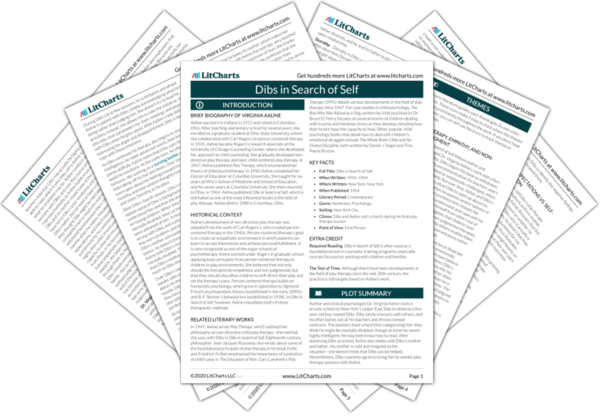Hedda Quotes in Dibs in Search of Self
At one time he seemed to be extremely retarded mentally. Another time he would quickly and quietly do something that indicated he might even have superior intelligence. If he thought anyone was watching him, he quickly withdrew into his shell. Most of the time he crawled around the edge of the room, lurking under tables, rocking back and forth, chewing on the side of his hand, sucking his thumb, lying prone and rigid on the floor when any of the teachers or children tried to involve him in some activity. He was a lone child in what must have seemed to him to be a cold, unfriendly world.
Dibs should learn to accept himself as he was and use his abilities, not deny them. But socially and emotionally, Dibs was achieving new horizons for himself. They were fundamental to his total development. I felt confident that the ability Dibs used in the playroom and at home would spill out into his other experiences. His intellectual abilities had been used to test him. They had become a barrier and a refuge from a world he feared. It had been defensive, self-protective behavior. It had been his isolation. And if Dibs did begin to talk, read, write, draw, in ways far beyond those of the other children around him, he would be avoided by them and isolated for his differences.
But he joined the circle and volunteered to do a dance one day. He made one up, much to the delight of the other children. He wanted to be the wind. He went blowing and swaying around and the children all decided that he should be the wind in the school program. Dibs agreed. He did his part very well. Suddenly in the middle of the dance he decided to sing. He made up the words and the melody. It went something like this. “I am the wind. I blow. I blow. I climb. I climb. I climb the hills and I move the clouds. I bend the trees and I move the grass. No one can stop the wind. I am the wind, a friendly wind, a wind you cannot see. But I am the wind.” He seemed to be unaware of his audience. The children were surprised and delighted. Needless to say, so were we.

Hedda Quotes in Dibs in Search of Self
At one time he seemed to be extremely retarded mentally. Another time he would quickly and quietly do something that indicated he might even have superior intelligence. If he thought anyone was watching him, he quickly withdrew into his shell. Most of the time he crawled around the edge of the room, lurking under tables, rocking back and forth, chewing on the side of his hand, sucking his thumb, lying prone and rigid on the floor when any of the teachers or children tried to involve him in some activity. He was a lone child in what must have seemed to him to be a cold, unfriendly world.
Dibs should learn to accept himself as he was and use his abilities, not deny them. But socially and emotionally, Dibs was achieving new horizons for himself. They were fundamental to his total development. I felt confident that the ability Dibs used in the playroom and at home would spill out into his other experiences. His intellectual abilities had been used to test him. They had become a barrier and a refuge from a world he feared. It had been defensive, self-protective behavior. It had been his isolation. And if Dibs did begin to talk, read, write, draw, in ways far beyond those of the other children around him, he would be avoided by them and isolated for his differences.
But he joined the circle and volunteered to do a dance one day. He made one up, much to the delight of the other children. He wanted to be the wind. He went blowing and swaying around and the children all decided that he should be the wind in the school program. Dibs agreed. He did his part very well. Suddenly in the middle of the dance he decided to sing. He made up the words and the melody. It went something like this. “I am the wind. I blow. I blow. I climb. I climb. I climb the hills and I move the clouds. I bend the trees and I move the grass. No one can stop the wind. I am the wind, a friendly wind, a wind you cannot see. But I am the wind.” He seemed to be unaware of his audience. The children were surprised and delighted. Needless to say, so were we.











